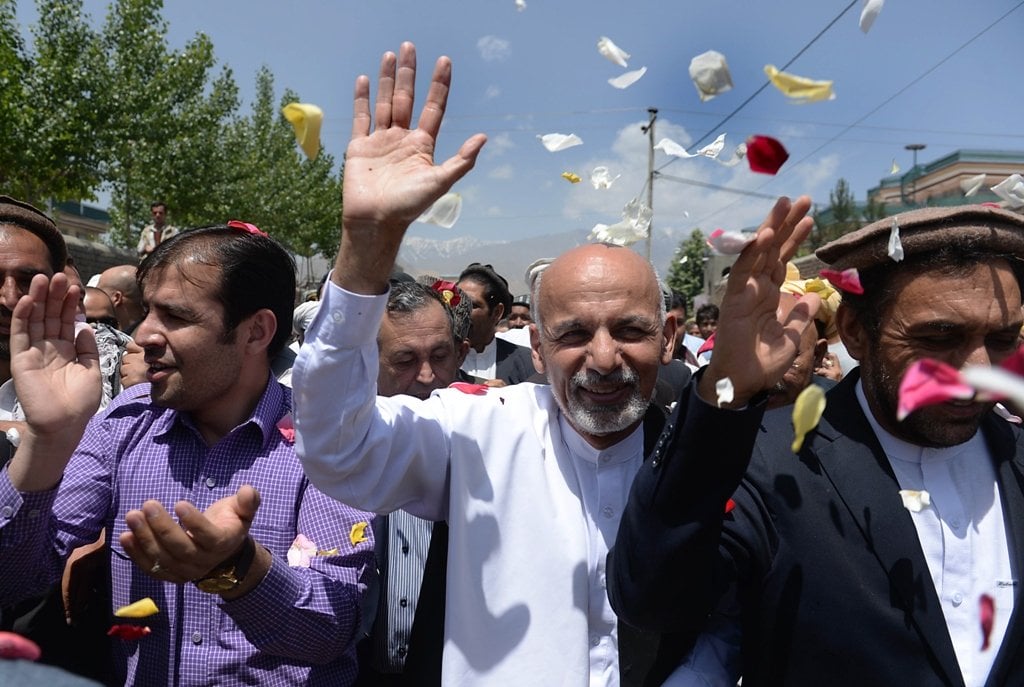
On the eve of the run-off election, Ghani told a US audience that as president he would immediately form a small consortium of key donors and outline economic reforms within 30 days.
The World Bank economist-turned-politician, speaking to the Center for National Policy in Washington via Skype, called corruption a "national shame" for Afghanistan, which has ranked near the bottom on annual corruption perception lists of Transparency International.
"We simply cannot persuade the US public in a time... of immense fiscal difficulty, from the level of community to the state to the federal level, that public money can be allocated to us without accountability and transparency," Ghani said.
The United States alone has provided some $100 billion in non-military assistance to Afghanistan since launching the war to oust the Taliban regime in the wake of the September 11, 2001 attacks. US officials have repeatedly urged President Hamid Karzai to do more on corruption, an insistence that has soured the two countries' relationship.
Ghani is facing former foreign minister Abdullah Abdullah, who came first in the initial round. Both Ghani and Abdullah have pledged to sign an agreement, which Karzai has refused to do, to allow nearly 10,000 US troops to stay in Afghanistan after this year when President Barack Obama plans to end combat operations.
Ghani said he would work to build relations with Pakistan, which was the main supporter of the Taliban until September 11. Afghan and US officials have accused Pakistani intelligence elements of maintaining links with extremists.
Ghani said that Afghanistan and Pakistan should integrate their economies better to take advantage of the growth of Asia, including the 2.5 billion-strong combined market of China and India.
"Afghanistan and Pakistan have a choice: Do we become Asian roundabouts or do we become cul-de-sacs?" he said.
Ghani said he would chart out a 10-year plan to develop closer ties with Pakistan on the model of how France and Germany reconciled after World War II.
In comments similar to those of Abdullah at a separate Washington event Thursday, Ghani said that Afghanistan and Pakistan should see common cause against extremists as both countries face attacks.
COMMENTS (4)
Comments are moderated and generally will be posted if they are on-topic and not abusive.
For more information, please see our Comments FAQ

1731583017-0/diddy-(42)1731583017-0-165x106.webp)


1719315628-0/BeFunky-collage-(8)1719315628-0-165x106.webp)
1731830002-0/BeFunk_§_]__-(1)1731830002-0.jpg)
1731829827-0/Untitled-design-(15)1731829827-0-270x192.webp)


1731821450-0/Untitled-design-(17)1731821450-0-270x192.webp)
1731822323-0/Copy-of-Untitled-(4)1731822323-0-270x192.webp)






@shae: Before access to the internet sucking up Pakistani govt propaganda might have been excusable - but not anymore. Pakistan has a long history of interfering with Afghanistan internal affairs and some would argue that it's use of "strategic assets" is tantamount to an act of war.
If Afghans give up constant anti Pakistan hatred, it would benefit them first and then Pakistan. Despite years of assistance to Afghans from Pakistani people and Pakistani government, we are fed up of Afghan sentiments, dont hide behind we hate the Pakistani govt but not the people, if you hate our govt, you hate us all. The govt is not made up of people from Mars....despite the harm done to our relations by Hamid Karzai, I dont wish ill for Afghans, but they too must stop wishing ill for us on every forum and enough is enough, stop whining about Pakistan like zanana, be men and take control of your own taqdeer.
@objective observer: My friend, Pakistan has helped million of Afghanis when they were in need. Gave them their land to live when USSR were bombing Afganistan day-in and day-out. Inspite of tha Afganis only brought heroin and Klashinkov culture with them to Pakistan and made North-West borders of Pakistan so volatile. So dont talk about who should understand what. Afghans should officially thank Pakistani people and government for their decades of support and stop The policy of Pakistan bashing in media.
“Afghanistan and Pakistan have a choice: Do we become Asian roundabouts or do we become cul-de-sacs?” he said.
If only Pakistan could develop such vision.